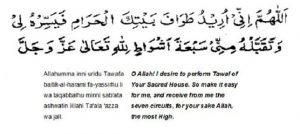It is difficult to change into Ihram on the flight. Pilgrims travelling to Makkah from other countries should wear it from their departing airports. However, you must declare the intention after reaching Meeqat. After reaching Rabigh which is a Meeqat for pilgrims arriving from the UK, you must state your intention by reciting the following dua:
اَللَّهُمَّ اِنِّیْ اُرِيْدُ الْعُمْرَة فَيَسِّرْهَالِیْ وَتَقَبَّلْهَا مِنِّیْ وَاَعِنِّیْ عَلَيْهَا وَبَارِکْ لِیْ فِيْهَا نَوَيْتُ الْعُمْرَة وَاَحْرَمْتُ بِهَا ِﷲِ تَعَالٰی
After reciting this prayer, you have assumed the state of Ihram which will remain so till the end of your Umrah. Your intention of performing Umrah should be pure only for the sake of Allah and not because of a desire to impress others. You must not miss your regular prayers (five times a day).
It must be noted that King Abdulaziz International Airport is not the Meeqat and pilgrims should not make the mistake of assuming Ihram at the airport. Ignorance on the part of pilgrims may result in the penalty of Dam. An animal should be sacrificed as a penalty if pilgrims make the mistake of assuming Ihram at the airport. Only the natives of Jeddah can officially start their Umrah from here. Follow the previous dua with the Talbiyah which is an announcement of the previous declaration.
لَبَّيْکَ اَللَّهُمَّ لَبَّيْکَ، لَبَّيْکَ لاَ شَرِيْکَ لَکَ لَبَّيْکَ، اِنَّ الْحَمْدَ وَالنِّعْمَة لَکَ وَالْمُلْکَ، لاَ شَرِيْکَ لَکَ-
(Labbaik Allahumma Labbaik)
Men are required to recite the Talbiyah loud whereas women can say it with low voice. Talbiyah should be recited three times with utmost respect and often repeated during the Umrah. Also, it is the best to memorize dua for Umrah with their translations before leaving for the journey.
On witnessing Kaa’ba for the first time:
Enter Masjid Al Haram with your right foot and recite the following dua:
اللَّهُمَّ صَلِّ عَلَى مُحَمَّدٍ وسلم, اللَّهُمَّ افْتَحْ لِي أَبْوَابَ رَحْمَتِكَ
(In the name of Allah and Salat and Salam upon Rasulullah .O Allah! Open to me the gates of Your Mercy)
Take the moment to savor the sight of the Kaabah and its magnificence when your first gaze falls upon it. Be grateful to Allah (SWT) for the opportunity and say aloud three times in a row:
الله أكبر لا إله الا الله
This is a special moment when it is likely for prayers to be accepted so make dua and ask Allah for anything that your heart desires.
Performing Tawaf or circumambulation of the Kaaba:
The Tawaf must be performed in the state of wudu. Before starting with Tawaf, make a slight change in the top piece of Ihram (male pilgrims only). Cover the left shoulder with one end of the Ihram and pass the other end under the right arm so that your right arm and shoulder is bared and left shoulder covered. This is called Idtiba. Now, proceed to the Hajr-e-Aswad, (the black stone) while reciting the talbiyah. The starting point of your Tawaf should be the brown line that runs from the Hajr-e-Aswad till the end of the Mataf (an open area for Tawaf). Stand facing the Kaabah with brown line on your right. Stop reciting talbiyah and make your intention:
“O’ Allah I intend performing Tawaf of your sacred house, (seven rounds) So make my Tawaf easy for me and O’ Allah accept it from me.”
Now stand on the brown line and facing the Hajr-e-Aswad with your face and chest in line with the black stone. Raise both hands as in Salah and recite the following:
“Bismilah allahu akbar, la ilaha illallah was lillahil hamd”
(In the name of Allah – Allah is the greatest. There is none worthy of worship besides Allah and all praise belongs to Allah)
Now, proceed towards the Hajr-e-Aswad and kiss it without harming anyone. If it is too crowded and you are unable to kiss the black stone, stretch your arms with the palms facing the Hajr-e-Aswad and recite, BISMILLAHI ALLAHU-AKBAR then kiss your palms as a substitute. To kiss or touch Hajr-e-Aswad is called Istilam.
Your Tawaf formally begins from here. Male pilgrims are required to perform the first three rounds of Tawaf at a brisk pace with the chest out (this is called ramal ) the last four rounds are to be performed at a normal walking pace. The Hatim (a low, half circle shaped marble wall close to the Ka’bah) has to be encircled as well or your Tawaf will be incomplete. Every time you circle the Kaabah, you should touch the rukn-e-Yemani (the Yemani corner) with your right hand, it is mustahab. Do not kiss it or place your forehead against it. If you are unable to touch it, move on with your Tawaf. Every time you reach the Hajr-e-Aswad perform Istilam. Complete the seven rounds in this manner.
After completing the Tawaf, make dua in soft voice. It is better to make dua in a language that you understand. There is no fixed dua for each round. You can recite any dua that you remember. The most recited dua by Prophet Muhammad (pbuh) and Sahabas to be recited between Rukn-e-Yamani and Hajr-e-Aswad was,
“Rabbana Aatina fiddunya Hasanah wa fil akhirathi hasanah wa qina azaban naar”
(Our lord! grant us good in the world and in the hereafter and save us from the fire of Hell)
Go to Multazam and make dua at your heart’s desire. The area between the door of the Kaaba and Hajr-e-Aswad is called Multazam. Prayers made at this point are likely to be accepted. Seek forgiveness from Allah (SWT).
Praying at Maqam-e-Ibrahim:
Afterward, move to Maqam-e-Ibrahim to offer 2 raka’t nafl salah if it’s not makrooh time. These two raka’t are wajib salah and the recommended Surahs are Al-Kafiroon and Al-Ikhlaas.
Zamzam Well
Move to the well of zamzam after performing the Salah at Maqam-e-Ibrahim. Drink zamzam to your fill and pour some over your head. Zamzam water purifies the body and soul. Prophet Muhammad (pbuh) would say the following dua before drinking zamzam:
“O’ Allah I am asking you for beneficial knowledge and extensive sustenance and a cure from all ills”
The zamzam well has been closed to the public now. You will see water coolers placed side by side in long rows. Pilgrims move to these water coolers to drink zamzam after their Tawaf.
Performing Saa’ee:
Performing saa’ee is an obligatory ritual in Umrah which can be performed only after completing Tawaf. There is no saa’ee without Tawaf or before it. Saa’ee begins from Safa and comprises of seven rounds between the hills of Safa and Marwa. When a pilgrim reaches the point marked with green pillar, he should start running with medium pace and then again resume the normal pace. This is called Ramal. Only men are required to perform Ramal. Women should walk with their usual pace.
Ascend the Safa and before starting Saa’ey make the intention by facing the Kaaba and reciting the following:
(O Allah! I intend to make seven rounds of Sa’ey between Safa and Marwah, for Your pleasure. Make it easy for me and accept it.)
Thereafter raise both arms whilst facing the Qibla and make a high-sounding call three times in a row:
اللّهُ أكبر, اللّهُ أكبر, اللّهُ أكبر
Pray to Allah as much as you can and make dua. This is the place for it. Ascend the Marwa Hill next. After reaching the Marwa Top, face the Kaaba and lift your hands to resound the call again three times:
اللّهُ أكبر, اللّهُ أكبر, اللّهُ أكبر
Complete the seven circuits in this way and end your Saa’ee at Safa – Marwa. After completing Saa’ee, it is recommended to perform 2 raka’t nafl prayers at Masjid-ul-Haram.
To finish the Umrah, men must shave their heads while women are required to merely cut their hair an inch shorter. Shaving or clipping of hair must be performed in the precincts of Haram. Now you can exit the state of Ihram and there is no more restriction.
Umrah Mubarak:
The entire stay in Makkah along with ziyarat of the Islamic sites like Masjid an-Nabawi, the Quba Mosque, Mount Uhud and Jannat-Al-Baqi allow for some of the most enthralling experiences. Always remember your worship of Allah is a direct reflection of your intention and it must remain pure. Do not engage in idle chitchat. Try to concentrate and devote your time in the remembrance of Allah.
Note: It is recommended to consult and seek an opinion from scholars on doubtful Islamic matters.



















